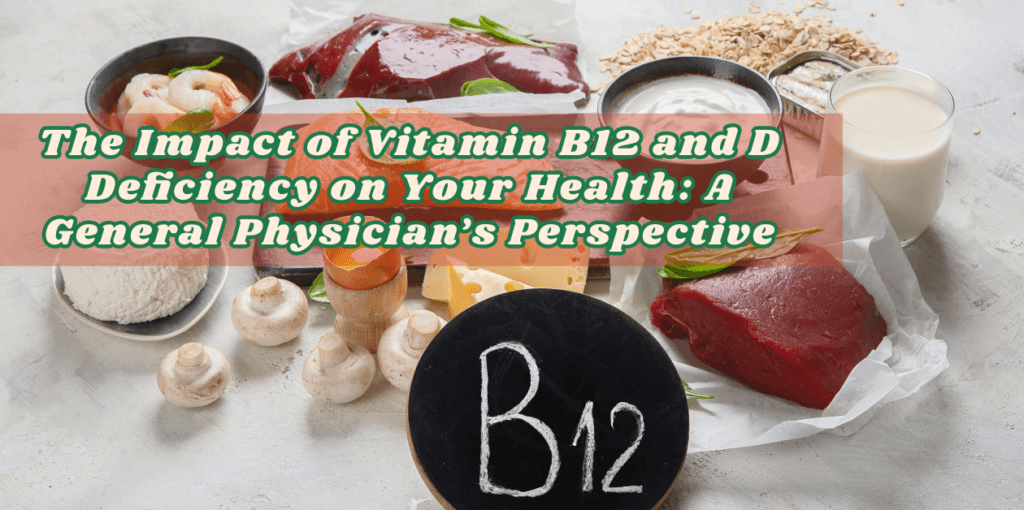The Impact of Vitamin B12 and Vitamin D Deficiency on Your Health: A General Physician’s Perspective

Vitamins play a crucial role in maintaining our overall health, and deficiencies in essential vitamins can lead to significant health issues. Among these, Vitamin B12 and Vitamin D deficiency are particularly common and can have profound impacts on your health. As a general physician, I often encounter patients with these deficiencies, and it’s important to understand their causes, symptoms, and treatments.
Understanding Vitamin B12 Deficiency
Vitamin B12 deficiency, also known as cobalamin deficiency, is essential for the production of red blood cells, DNA synthesis, and the proper functioning of the nervous system. Unfortunately, Vitamin B12 deficiency is relatively common, especially among older adults and those following a strict vegan diet.
Causes of Vitamin B12 Deficiency
- Dietary Insufficiency: People who do not consume enough animal products, such as meat, dairy, and eggs, are at risk of Vitamin B12 deficiency.
- Absorption Issues: Conditions like pernicious anemia, Crohn’s disease, and celiac disease can impair the absorption of Vitamin B12 from the digestive tract.
- Medications: Long-term use of certain medications, such as metformin for diabetes and proton pump inhibitors for acid reflux, can interfere with Vitamin B12 absorption.
Symptoms of Vitamin B12 Deficiency
- Fatigue and Weakness: A lack of Vitamin B12 can lead to anemia, causing fatigue and weakness.
- Neurological Issues: Symptoms may include numbness and tingling in the hands and feet, difficulty walking, and memory problems.
- Psychological Symptoms: Depression, irritability, and cognitive decline can also be associated with Vitamin B12 deficiency.
Treatment and Prevention
- Dietary Changes: Incorporating more Vitamin B12-rich foods, such as meat, fish, dairy, and fortified cereals, can help prevent deficiency.
- Supplements: Vitamin B12 supplements or injections may be necessary for those who cannot absorb the vitamin properly.
- Regular Monitoring: Regular blood tests can help monitor Vitamin B12 levels, especially in high-risk individuals.
Understanding Vitamin D Deficiency
Vitamin D deficiency is crucial for bone health, immune function, and overall well-being. It helps the body absorb calcium, which is essential for maintaining strong bones. Vitamin D deficiency is widespread, affecting people of all ages and backgrounds.
Causes of Vitamin D Deficiency
- Limited Sun Exposure: The body produces Vitamin D when the skin is exposed to sunlight. People who spend little time outdoors or live in areas with limited sunlight are at risk.
- Dietary Insufficiency: Few foods naturally contain Vitamin D. Fatty fish, fortified dairy products, and egg yolks are some sources.
- Absorption Issues: Conditions like Crohn’s disease, celiac disease, and obesity can affect the body’s ability to absorb Vitamin D.
Symptoms of Vitamin D Deficiency
- Bone Pain and Muscle Weakness: Vitamin D deficiency can lead to bone pain, muscle weakness, and an increased risk of fractures.
- Fatigue and Tiredness: Low levels of Vitamin D can cause fatigue and a general sense of tiredness.
- Mood Changes: Depression and mood swings have been linked to Vitamin D deficiency.
Treatment and Prevention
- Sun Exposure: Spending time outdoors in sunlight can help boost Vitamin D levels. Aim for about 10-30 minutes of midday sunlight several times a week.
- Dietary Changes: Include more Vitamin D-rich foods in your diet, such as fatty fish, fortified dairy products, and egg yolks.
- Supplements: Vitamin D supplements can be an effective way to ensure adequate intake, especially for those at risk of deficiency.
The Importance of Addressing These Deficiencies
Both Vitamin B12 and Vitamin D deficiencies can have serious health consequences if left untreated. They can affect your energy levels, bone health, and overall quality of life. As a general physician, I recommend regular check-ups and blood tests to monitor these vital nutrients, especially for individuals at higher risk.
Conclusion
Understanding the impact of Vitamin B12 and Vitamin D deficiencies is crucial for maintaining good health. By recognizing the symptoms and taking proactive steps to address these deficiencies, you can improve your overall well-being. If you suspect you might be deficient in either of these vitamins, consult with your healthcare provider for proper diagnosis and treatment.
About Author
Dr. Havisha
MBBS ,MD General Medicine 6+ years Experience
Dr. Havisha is a dedicated Consultant General Physician at Pi Health Cancer Hospital in Gachibowli, Hyderabad. With 6 years of clinical experience, she specializes in the management of various conditions including fever, thyroid disorders, diabetes, hypertension, arthritis, headache, abdominal pain, allergies, jaundice, and dizziness. Dr. Havisha’s comprehensive approach to patient care and her expertise in both acute and chronic conditions make her a valuable asset to the hospital.

